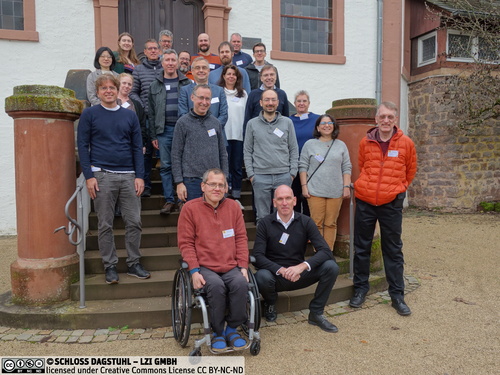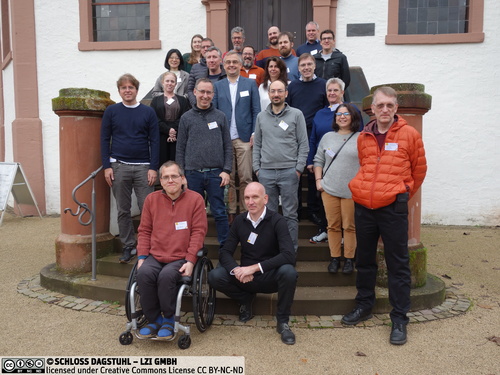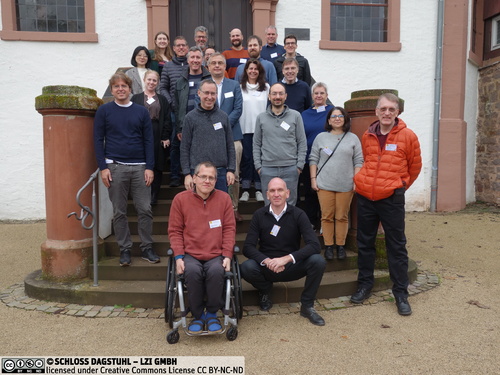Dagstuhl-Seminar 22471
Towards More Flexible and Automated Communication Networks
( 20. Nov – 23. Nov, 2022 )
Permalink
Organisatoren
- Rui Aguiar (Institute of Telecommunications - Aveiro, PT)
- Artur Hecker (Huawei Technologies - München, DE)
- Stefan Schmid (TU Berlin, DE)
- Henning Schulzrinne (Columbia University - New York, US)
Kontakt
- Michael Gerke (für wissenschaftliche Fragen)
- Christina Schwarz (für administrative Fragen)
Viewed from the perspective of users, communication networks just work fine and have not changed much recently. Under the hood, however, they are currently undergoing substantial changes, which are partly driven by new technologies, such as software-defined networking (SDN) and network function virtualization (NFV), and partly by new requirements, such as reducing operational costs and increasing reliability. SDN and NFV enable programming the behavior of these networks on-demand through software, so that functions and services can be flexibly deployed on short time scales at suitable locations in the network. The drawback of this enhanced flexibility is that, without proper tools, managing and operating such networks becomes more and more challenging. This complexity and the pressures to reduce costs call for largely autonomously operating - or self-driving - networks, i.e. networks with only limited manual intervention.
It is a challenge to provide robust and performant control planes and connectivity in such highly flexible and demanding networking environments, since the notions of control and data plane, by definition, are both related to the notion of the service to be provided. Hence, a network supposed to actively support services with challenging and varying requirements, will also be flexible, and this not just in terms of how it switches flows, but also in terms of the supported queuing models, protocol stacks, deployed and used network and service functions, and even in terms of its own topology. Such a flexible data plane will require an equally flexible control plane capable both of embracing new nodes with new capacities and capabilities and of re-allocating all tasks to new nodes in a shrinking network. The sharing of resources, both in capabilities and in capacities, needs to be efficiently supported not only between different services, but also between the respective control and data planes. Moreover, suitable distributed runtime scheduling algorithms are required in order to utilize and share network resources efficiently and to fulfill highly demanding requirements from certain network slices, e.g., ultra-reliable low latency communication in case of industrial networks. Also, network debugging and diagnostics need to cope with these new demands. It needs to be investigated, to what extent artificial intelligence and machine learning can be applied. This, however, is a rather new topic in the networking domain.
Consequently, the proposed seminar brought together experts from "classical" networking, distributed systems and machine learning for networks.
 Artur Hecker, Stefan Schmid, and Henning Schulzrinne
Artur Hecker, Stefan Schmid, and Henning Schulzrinne
Viewed from a user perspective, communication networks work just fine. They, for example, deliver videos and other contents seamlessly and more or less reliably to end users. Furthermore, new technologies such as programmable networks and virtualization propel the potential of communication networks to a new level. Their behavior can now be programmed on-demand through software, and functions/services can be flexibly deployed at suitable locations in the network through network function virtualization. However, it has proven highly challenging to fully exploit this potential. Multiple virtual networks need to be operated on the same physical infrastructure without disturbing each other, realizing so-called network slices. Within some of the slices, strict performance guarantees are required (e.g., ultra-reliable low latency operation in some industrial environments).
Managing and operating such networks becomes increasingly challenging and calls for new approaches that can tackle the inherently increasing complexity. In particular, communication networks should increasingly operate autonomously without manual intervention. This also requires appropriate monitoring and data analysis approaches, as well as methods to describe and handle the “intent”, how the network should behave in order to fulfill user and service requirements. Generally, a more flexible usage of costly network infrastructures could help radically cut the service provisioning time while keeping the total cost of ownership low.
Besides traditional networking techniques, aspects of distributed systems become increasingly important, e.g., with respect to runtime, non-local resource scheduling. Moreover, modelling such complex networks in closed forms (e.g., queueing theory) appears to be increasingly less promising. Focusing, for example, on single TCP connections in the context of congestion control in such emerging complex and more and more automated communication environments appears to have strong limits. Therefore, machine learning recently also gets more attention in the networking community.
Consequently, autonomously operating and self-driving communication networks could highly profit from an interdisciplinary approach, e.g., including “classical” networking, distributed systems and machine learning. Our Dagstuhl Seminar will serve this interdisciplinary purpose. It will bring together experts from these disciplines including industry as well as academia. More specifically, synergies among the following aspects of automation in communication systems are considered: deployment and dynamic adjustment of (virtualized) network and upper-layer; services including demand-driven relocation of functionalities and services; robust and performant control planes in highly dynamic and autonomous communication; systems that share common networking resources potentially also with the data plane; network debugging and diagnostics (e.g., automated detection of routing failures or DDoS attacks).
We are also open to different types of networks and consider the entire spectrum, including wired/wireless/cellular/hybrid networks. This way, we may be able to discover new synergies and application domains within the Dagstuhl Seminar. This follows also the observation that the network landscape is becoming increasingly more diverse considering both, the technological as well as the administrative domain. So, this calls in general for concepts that can deal with this increasing diversity.
 Rui Aguiar, Artur Hecker, Stefan Schmid, and Henning Schulzrinne
Rui Aguiar, Artur Hecker, Stefan Schmid, and Henning Schulzrinne
- Gianni Antichi (Queen Mary University of London, GB) [dblp]
- Chen Avin (Ben Gurion University - Beer Sheva, IL) [dblp]
- Roland Bless (KIT - Karlsruher Institut für Technologie, DE) [dblp]
- Georg Carle (TU München, DE) [dblp]
- Klaus-Tycho Foerster (TU Dortmund, DE) [dblp]
- Fabien Geyer (Airbus - München, DE) [dblp]
- Sergey Gorinsky (IMDEA Networks Institute - Madrid, ES) [dblp]
- David Hay (The Hebrew University of Jerusalem, IL) [dblp]
- Artur Hecker (Huawei Technologies - München, DE) [dblp]
- Lily Hügerich (TU Berlin, DE)
- Karin Anna Hummel (Johannes Kepler Universität Linz, AT) [dblp]
- Sándor Laki (Eötvös Lorand University - Budapest, HU) [dblp]
- Shir Landau Feibish (The Open University of Israel - Raanana, IL) [dblp]
- Huiran Liu (TU Berlin, DE)
- Gábor Rétvári (Budapest University of Technology & Economics, HU) [dblp]
- Dario Rossi (Huawei Technologies - Boulogne-Billancourt, FR) [dblp]
- Iosif Salem (TU Berlin, DE)
- Gabriel Scalosub (Ben Gurion University - Beer Sheva, IL) [dblp]
- Stefan Schmid (TU Berlin, DE) [dblp]
- Henning Schulzrinne (Columbia University - New York, US) [dblp]
- Cigdem Sengul (Brunel University - London, GB) [dblp]
- Martina Zitterbart (KIT - Karlsruher Institut für Technologie, DE) [dblp]
Klassifikation
- Networking and Internet Architecture
Schlagworte
- software-defined networking
- self-driving networks
- automation
- machine learning




 Creative Commons BY 4.0
Creative Commons BY 4.0
